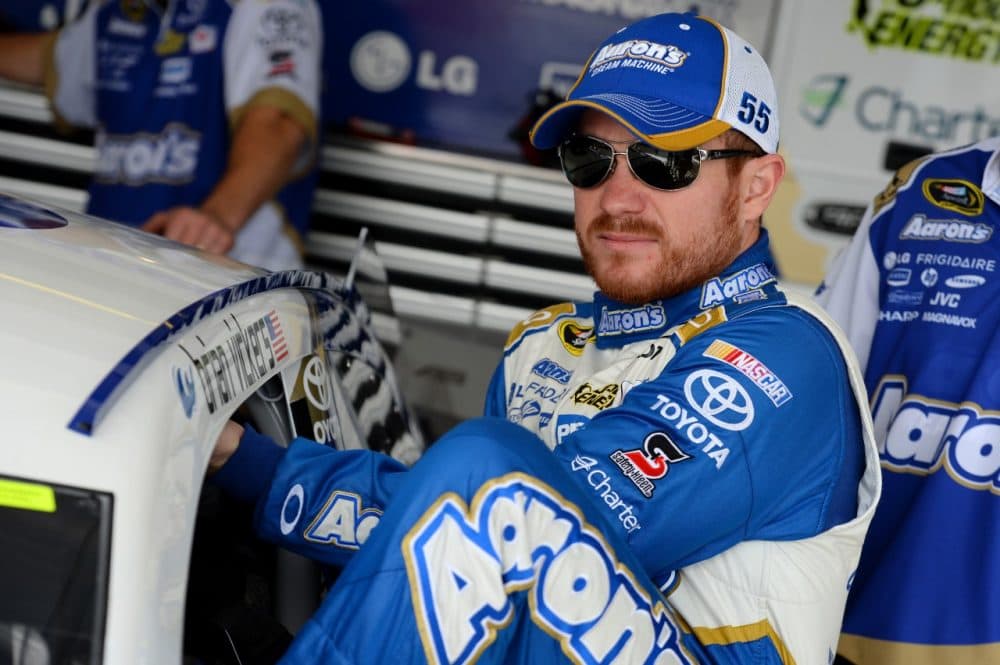Advertisement
NASCAR's Brian Vickers Returns To Racing

This weekend at the Bristol Motor Speedway in Bristol, Tenn., NASCAR is hosting the Food City 500. For Sprint Cup Series driver Brian Vickers, racing at over 200 miles an hour with the threat of pileups and spectacular crashes is just another day at the office. But one of the scariest moments of his life began not in a racecar, but on a bicycle. And it has forced him to stop racing twice since.
Brian Vickers joined Bill Littlefield on Only A Game to explain the story.
BL: Let's start with your first blood clot episode back in 2010. Tell us about how a bike ride with a friend gave you the warning signs that your life was in danger.
[sidebar title="Michael Waltrip's Mixed Emotions" width="330" align="right"]Vickers drives for Michael Waltrip Racing. In 2001, Waltrip got his first NASCAR victory on the same day that Dale Earnhardt was killed. We spoke to Waltrip about his book about that day.[/sidebar]BV: Well, it did. It gave me the warning signs; I just didn't listen. Back in 2010, I was having shortness of breath on a bike ride that eventually turned into some painful breathing. I really ignored the signs longer than I should have, and I was diagnosed with a clot or DVT in my left leg and clots called a PE — a pulmonary embolism — in my lungs.
And the doctor put me on warfarin which came along with some dietary restrictions, regular blood monitoring, but I was able to complete that treatment and get back in the car after about six months and go racing again. Unfortunately, right after that high we hit another speed bump, and I had another clot [last fall]. This time it was after a crash at Bristol — I had a right mid-foot sprain. I had to wear a boot and after I took that boot off, after about a month, again I had some warning signs — some redness and some swelling in my right calf. Some tenderness. This time I did not make the same mistake.
BL: Were you surprised that it took six months the first time and three months the second time to get you back into action? 'Cause I think a lot of people might feel like blood clot, "OK, blood thinner, you're set."
BV: I'll tell you a funny story about the first time. I was laying in the hospital bed and the doctor says "OK, you have a blood clot." And this was on a Wednesday. I was in Washington D.C. He was explaining this to me, and I said, "Oh gosh, it's horrible, but just so you know, I need to be in the racecar on Friday. I've got practice in Dover. I've got the race on Sunday — I can miss practice, but I definitely can't miss Sunday." And he's just looking at me with this blank stare, and he's just like, "Son, I don't think you have any idea how serious the situation is," which is why I'm so passionate about this cause.
BL: Brian, it's fairly common knowledge that sitting still for a long period of time, as people have to do on long airplane flights, for example, can increase your risk for blood clots. Being a NASCAR driver requires a heck of a lot of sitting. Explain why your doctors don't think your career as a driver contributed to the problems you had.
Son, I don't think you have any idea how serious the situation is.
Bryan Vickers' doctor
BL: You are currently in 20th place in the Sprint Cup standings. The leader is Dale Earnhardt Jr. who won the Daytona 500 and finished in second in the two races since then. Brad Keselowski is second. He won last weekend and has finished in the top three in all three of his races so far. Have you ever seen two drivers get off to a hotter start than that?
BV: No, it's incredible. Those guys have definitely been on a run. Whether or not that's going to benefit them any has changed dramatically in the new Chase format. The way NASCAR's changed the rules you can under-perform [the leaders] by a large margin for most of the year as long as you capture that [one] victory. You know, it's certainly going to change the dynamic of the Chase. We've always fought hard for wins, but we'll even more so do that now.
This segment aired on March 15, 2014.